If you read the short description of my blog, part of it reads that my blog consists of "tips, tricks, rants, and wisecracks about life, education, politics, and just about anything in between." Throughout the years, I have most certainly written posts that address all of those things (perhaps you will disagree about the wisecracks part, although I think I'm clever at times 😃). This post is going to lean more toward the rant category. It's not going to be a rant about politics (I could definitely do that) or about any one person or thing, it's more of a rant about my own perceived abilities at this time. Confused? Read on...
I am generally a positive person. Of course, I have moments of negativity, we all do, but I usually move on from negativity quickly, trying to instill positivity when confronted with negativity, and if a toxic situation or person starts to bring me down, then I try to remove myself from the situation or person and avoid as much as I can in the future. Lately, I have had a hard time avoiding some negativity and perceptions that are invading my headspace. And in the spirit of airing out the not so good as well as the good, here goes!
Disclaimer: this, again, is not directed toward any one person or situation. This isn't meant for me to call anybody out. I also am not attempting to generalize any group of people. This is more of a way for me to vent some frustrations that have been plaguing me as of late.
This year has been especially tough thus far. I could identify a multitude of things between the extra class that I am teaching, coteaching economics for the first time, two nights of teaching adult education government, one night of Tech CAFE where I work with teachers on educational technology, an expanded caseload that increased by seven from last year, or the earlier schedule this year compared to last year. However, when talking to a lot of educators, it sounds like many are in the same boat, exhausted and just trying to keep it afloat. But it's not just these things.
What I am finding especially tough this year is the reception of my teaching from many of my students. My co-teachers and I work very hard to design engaging lessons, set expectations for our students, and instill management of our classes, but it feels like we are working extra hard at those things this year "without much in return." I feel that we have had many more conversations with students regarding the lack of participation in activities and the completion of tasks. I often feel that regardless of how engaging the lessons we design are, we are fighting the resistance from students (and adults). To say that I am frustrated is an understatement.
I feel that rather than teaching, I am trying to figure out ways to entertain. Now don't get me wrong, I want to teach engaging lessons that entertain, but I don't want the entertainment to be the main focus. I want my content and my goals of learning to be the focus. Because I feel that I am not motivating or entertaining enough, I am questioning my abilities as an educator.
I am a damn good teacher. I am confident in my abilities and I have nearly 15 years' worth of success stories of students that did amazing things in my classes and went on to do even greater things. This is not because of me, I was simply a guide in students' lives. But I am struggling this year, I am not seeing my hard work guiding students as much this year. And I don't know what else to think. Have I lost my touch? What do I need to do differently?
I am not afraid to be vulnerable through my words. I have admitted faults and weaknesses in the past, and I am hoping that if you are reading this, perhaps you have some words of wisdom that you can share with me or anybody else that is struggling to motivate your students, feeling overwhelmed, and questions your abilities. I sincerely hope that my words here can spark a conversation where we can help one another; this isn't an "oh woe is me" tactic, but a way to find a way to be better and be the best that I can for all of my students and my colleagues.
Until next time...

:no_upscale()/cdn.vox-cdn.com/uploads/chorus_asset/file/19260535/rev_1_JOK_15469_High_Res_JPEG.jpeg)

